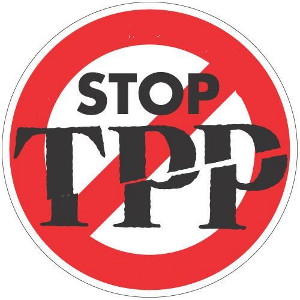
The New York Times reported serious worry in the U.S. Congress about the Trans Pacific Strategic Economic Partnership Agreement (TPP for short), a massive new free trade deal being pushed by the United States with the involvement of 11 other countries on both sides of the Pacific. About 170 Congresspersons have signed on to one or more of three letters which oppose fast track status for the deal.
On Wednesday also, Wikileaks released 95 pages and 30,000 words of the draft of just one component on the treaty, on intellectual property rights. This did nothing to calm the many who think the TPP is a giant corporate power grab.
The TPP began with free trade negotiations among Chile, New Zealand, Singapore and Brunei. It has been taken up as a major objective of the United States, and now also includes Japan, Vietnam, Malaysia, Mexico, Canada, Peru, and Australia, with others perhaps yet to come.
Pointedly excluded are China, and those Latin American countries that oppose the neo-liberal free trade model pushed by the United States via agreements like NAFTA, CAFTA-DR and the new U.S. free trade agreements with Colombia and South Korea.
The TPP is being negotiated in secrecy. Press, academics, legislators, most government officials and the general public, are not privy to the negotiations. However, representatives of some 700 major corporations are directly involved in the negotiating process. From what we have seen so far, they are making the most of this opportunity to increase profits.
The objection of the critics of the TPP and especially the secretive negotiating process is that if only corporations are involved in drafting the treaty, and if it is then rammed through Congress by December 3 on the “fast track” basis which the administration is asking for, the deal will favor corporate interests to the detriment of those of ordinary working people not only in the United States, but in all the countries participating and beyond. The draft chapter on intellectual property rights leaked by Wikileaks does nothing to assuage that fear.
Very problematic items include:
* Copyrights would be extended for decades more than current usage, from current life of the author or artist plus 50 years to life of the author or artist plus 70 years for individual authors, and for 120 years for corporate owned copyrights. The purpose of copyright is supposed to be to protect the interests of authors and artists and their heirs, but the proposed change transparently benefits corporations which are likely to have acquired the juiciest copyrights over the passage of time.
* Internet Service Providers would be required to police violations of this strengthened copyright law, and kick violators off the internet.
* Patents for pharmaceuticals would be strengthened, making it harder to produce and distribute generic medicines, thus impeding governments from making lifesaving medicines available to poor people. It would also extend the regime of medical patents to surgical methods currently exempt. This will greatly increase the cost of health care.
* In an item that seems to reveal ignorance of computer and Internet basics, copyright would be extended even to “temporary copies” of internet files. But whenever you do anything with a file on the Internet, your computer creates one or more “temporary copies” in order to carry out its basic functions!
The overall impact would be a massive increase of profits and power for transnational corporations at the expensive of sick people, internet users and the public.
In addition to the signatories of the Congressional letters, the TPP has raised worries on the part of labor and consumer groups.
In Latin America, the TPP will reduce the transpacific trade opportunities of countries which have followed the of rejecting the neoliberal formula of bogus free trade, privatization and austerity in favor of increased regional economic integration more regulation, less privatization and less dependence on, and subordination to, the United States.
In those countries that sign on to the TPP, ordinary citizens will lose the ability to fight back against rapacious transnational corporations who seize villagers’ land and water, displace rural populations and destroy the environment. Resistance to these abuses, and also to the introduction of genetically modified crops, will bring lawsuits from corporations. Right now in every one of the Latin American countries presently hooked into the TPP, there are fierce fights going on pitting transnational extractive corporations (mining, oil, etc.) against local farmers, workers and indigenous communities. This is happening in Mexico, Peru and Chile, and also in Colombia which is a likely TPP addition as it is already linked in free trade agreements to the other three Latin American TPP countries (via the Pacific Alliance) plus the United States. It is also happening in most Central American countries.
Sometimes the local people win; under the TPP, their chances of doing so will be greatly reduced.
Photo: IndyMedia












Comments